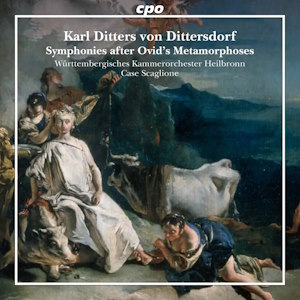
Karl Ditters von Dittersdorf (1739-1799)
Symphonies after Ovid’s Metamorphoses (1786)
Symphony No. 1 in C major ‘The Four Ages of the World’
Symphony No. 2 in D major ‘The Fall of Phaeton’
Symphony No. 3 in G major ‘The Metamorphosis of Actaeon into a Stag’
Symphony No 4 in F major ‘The Rescue of Andromeda by Perseus’
Symphony No 5 in A major ‘The Transformation of the Lycian Peasants into Frogs’
Symphony No 6 in D major ‘The Petrification of Phineus and his Friends’
Württembergisches Kammerorchester Heilbronn/Case Scaglione
rec. 2020, Theodor-Heuss-Sall, Harmonie concert and congress centre, Heilbronn, Germany
cpo 555 429-2 [2 CDs: 120]
Such is the domination of Haydn, Mozart and Beethoven that it can be hard for lesser composers of the Viennese classical period to get a hearing. Such is the case with these symphonies: Dittersdorf is a name I have known for years, but this is the first time I have actually come across any of his music.
Karl Ditters von Dittersdorf was a native Viennese. He studied with Gluck but spent much of his life as a court composer in Johannesburg, now Javornik in the Czech Republic. He was friends with both Haydn and Mozart and there is a delightful story of the three of them, together with Dittersdorf’s pupil Wanhal, playing string quartets together. Dittersdorf was very prolific, with some dozen operas, around one hundred and twenty symphonies, as well as concertos, masses and chamber music attributed to him. Much of this remains unpublished, and nowadays he is remembered mainly for these symphonies and the singspiel Doktor und Apotheker, generally considered his masterpiece. His music sounds quite similar to Haydn and Mozart, but he eschews development, and I also hear some influence from the dance movements in Gluck’s operas.
These symphonies, the survivors of an original set of twelve of which the others have been lost, though the composer originally projected writing fifteen, are each based on a tale from Ovid’s Metamorphoses. This, along with Virgil’s Aeneid, has always been the mostly widely read long Latin poem. It retells some two hundred and fifty myths, linked to one another in various ways and all featuring some form of transformation. Ovid is a supreme story teller and a delightful companion and his poem has always been a principal source of classical mythology for poets, painters and musicians.
Each of these symphonies is in four movements and follows its myth fairly closely. They are, in fact, early examples of programmatic symphonies, of a kind made famous by Beethoven’s Pastoral Symphony of a few years later. Dittersdorf supplied the programme for his publishers. The sleevenote provides that for the fourth symphony, The Rescue of Andromeda by Perseus,, and as this is probably also the best of the symphonies, I give it here as an example. The first movement, Adagio non molto, has a wailing oboe over pulsating strings, which the note suggests represents dawn by the coast, but which to me represents in particular Andromeda, tethered to the rock waiting for death from the sea-monster. The movement seems loosely modelled on Gluck’s Dance of the Blessed Spirits from Orfeo ed Euridice. The succeeding Presto shows Perseus coming through the air on a winged horse to rescue her. The Larghetto returns us to Andromeda. The final Vivace gives us the battle between Perseus and the monster and the joy of the bystanders.
A similar programme can be worked out for the other symphonies,. But we are not given these, and I leave the issue to the listeners, who may want to refresh their memories or to explore Ovid’s enchanted world for themselves. The music is always attractive and varied, without being particularly profound or probing. It is high class entertainment music of the time.
The performances here are lively and effective. The Württemberg Chamber Orchestra is a well-established band and Case Scaglione has been its chief conductor for six seasons. The recording is good. There have been other recordings but there is no need to look further: this will do very nicely.
Stephen Barber
Buying this recording via a link below generates revenue for MWI, which helps the site remain free



















